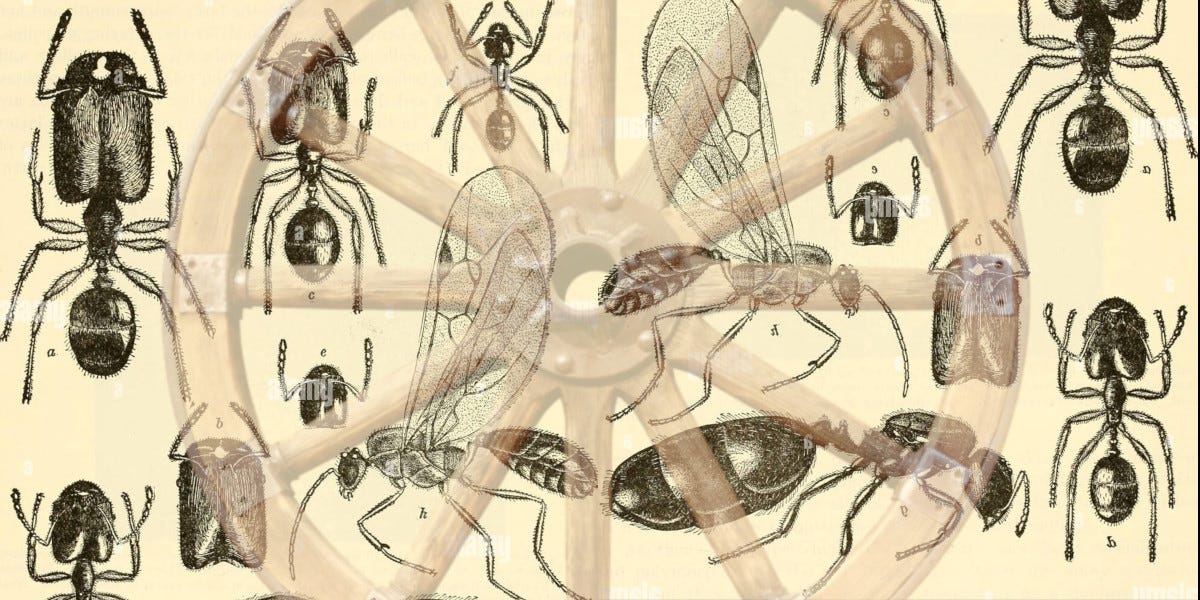Beyond the Hive University
How the university's old purpose of keeping the wheel of knowledge turning failed, and left in its place the specialisation of an insect colony
“What then is possible? The answer is: the university as a place of constrained disagreement, of imposed participation in conflict, in which a central responsibility of higher education would be to initiate students into conflict.” - Alasdair Macintyre
The failure of the twenty first century university has a long history, well-studied by Alasdair Macintyre. As he made clear, for the university scholars of the nineteenth century it was beyond doubt that there was a unity to the rationality of thought practiced in universities. The application of this rational thought made a field of enquiry into a science. Furthermore - and here many contemporary folks struggle! - natural theology and the foundations of ethical thought were also a science in this older sense. The prototype for what we call an encyclopaedia, the Encyclopaedia Britannica, was animated by this inherent unity to thought. Without such a conception, this project could never have even been attempted.
Yet the challenge to the university’s faith in the unity of knowledge had already begun. The nineteenth century philosopher Friedrich Nietzsche (neet-chuh), from whose rebellious intellectual soil so many contemporary weeds have sprouted, felt the university already compromised. He prophetically warned: “No genuinely radical living for truth is possible in a university.” Conservatives blame the infestation of critical theorising in contemporary universities on Karl Marx, but while Marxist influence is part of the story, it is from Nietzsche’s fire that the angry mob lit their torches. He was not, however, to blame, so much as he saw clearly - long before anyone else did! - the coming storm that would inevitably follow from the collapse of a shared theology.
What made the university a ‘whole’ (it is no coincidence that the root of this word is shared with ‘universe’) was that its disparate enquiries were bound together by a unifying core of moral philosophy. In the nineteenth century, this was informed by Christian theology. As the rise of the secular society made it untenable for universities to maintain that hub of the wheel, the spokes ceased to revolve around a common centre. Simultaneously, the complexity of accumulated knowledge exceeded any hope of maintaining a core set of texts. A scholar in the fifteenth century could have read every book. The printing press rendered this feat impossible, accelerating specialisation in disparate fields at precisely the same time that the old unifying principles collapsed.
Into the rotting wood of the broken wheel festers a degeneration of the old university, organised now around the specialisation of an insect colony. Small wonder that these hive universities are now only rarely governed by a community of scholars, and far more often by a bureaucratic tyrant - the Vice Chancellor as termite queen. Precisely because such unfortunates are tasked with being at the hub of a decaying wheel whose spokes careen in all directions, this role drives many people insane. Those that survive largely focus upon the mindless substitution of economics for theology. I know of at least one ‘university’ more interested in its real estate portfolio than in the pursuit of knowledge.
Yet the hive university is not an inevitability, and as the rot at the heart of our fallen universities becomes increasingly apparent to everyone, we have a chance at recovery. First, however, we have to appreciate that the university’s purpose is not - and never has been! - research. Nineteenth century scholars felt other kinds of institutions were better suited to this purpose. Rather, by being communities of scholars capable of elaborating standards of justification, the university was once - and might be again - a place where society as a whole can learn how to conduct meaningful debates. The absence of such productive discourse in today’s ‘public square’ is itself a symptom of the hollow specialisations of the hive university.
Beyond the insect rationality of these grant-farming termite mounds lies the revival of the university imagined by Macintyre, beautifully captured in the quote above. No more churning out of mindless drones with soft-minds cocooned away from anything that might challenge them! However, we need not (and cannot) restore theology to its central position. Besides, the faithful need to appreciate that multiplicity is as essential to God’s creation as unity. Yet we must recover a shared moral philosophy that can secure principles at the hub of the wheel of knowledge, allowing it once again to turn. With this first groaning revolution comes the dethroning of the unwarranted authority of dubious ‘experts’, and the recovery of the open debate that is crucial to our pursuit of the truth.




Some excellent observations here, Chris, but I don't see the source of optimism. I'm finding folks blithely unaware that they've abandoned the core ethical values that make democratic society work. They believe they're moral beings, mind you. It's just that folks outside their tribe have no right to voice a different position.